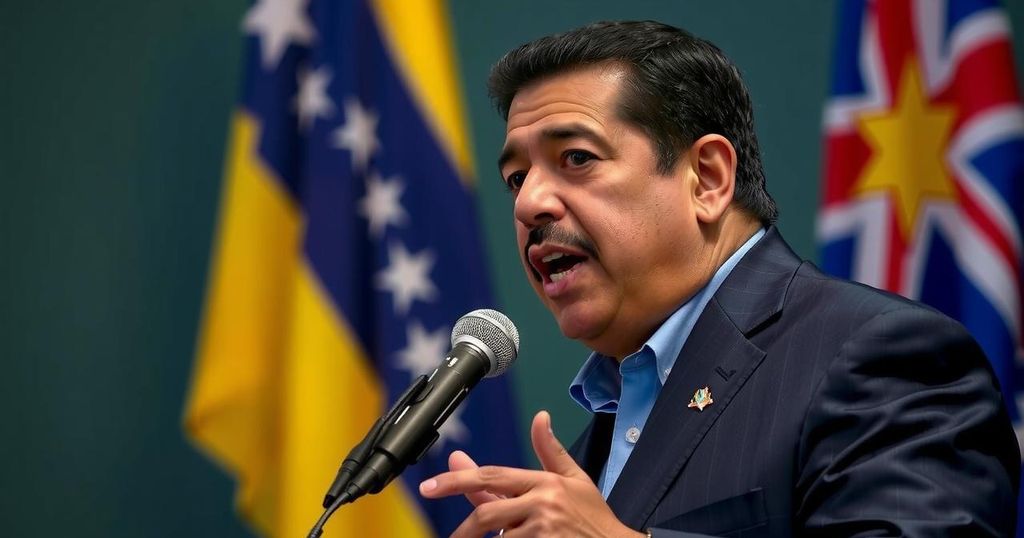Maduro Vows Venezuela Will Not Be Silenced After BRICS Membership Bid Blocked

Nicolas Maduro of Venezuela vowed that his country would not be silenced following Brazil’s veto of its BRICS membership application. Amid ongoing economic turmoil and a controversial election result, allegations of a breach of trust have strained relations between Venezuela and Brazil. Maduro claimed to retain support from other nations, asserting his electoral victory despite significant opposition claims.
On October 26, 2024, Venezuelan President Nicolas Maduro expressed his determination to ensure that his country remains vocal and assertive, particularly after Brazil vetoed Venezuela’s application to join the BRICS coalition of emerging economies. Amidst a severe economic crisis, which the Venezuelan government attributes to United States sanctions, Maduro has persistently sought to secure membership in BRICS—a group that currently includes Brazil, Russia, India, South Africa, and China, as well as new entrants such as Ethiopia, Iran, Egypt, and the United Arab Emirates from 2024. Following Brazil’s veto at the recent summit held in Kazan, Russia, Maduro lashed out at the decision, labeling it as a “hostile” and “immoral” action. Upon his return to Venezuela, he stated on state television, “no one will block or silence Venezuela, not today, not tomorrow, not ever.” While he refrained from specifically referencing Brazil in his remarks, this statement underscored his unwavering stance in the face of international opposition. Maduro’s relationship with Brazilian President Luiz Inacio Lula da Silva, previously characterized by alliance, has come under strain post the disputed presidential election held on July 28, 2024. Opponents assert that Maduro’s re-election was marred by irregularities, with allegations suggesting that he might have been defeated by his rival Edmundo Gonzalez Urrutia, who subsequently fled to Spain following a warrant issued for his arrest. Concerns linger regarding Maduro’s failure to fulfill his commitment to disclose comprehensive results from the election, which has fueled distrust among allies, including Brazil. Celso Amorim, former Foreign Minister and advisor to President Lula, indicated that the veto arose from a “breach of confidence” due to this lack of transparency. Moreover, Maduro claimed to have met with representatives from nearly thirty nations at the Kazan summit, stating that they praised his “great electoral victory.” Nevertheless, the skepticism surrounding Venezuela’s electoral processes, as expressed by the Opposition and corroborated by withheld information, continues to pose a significant challenge to Maduro’s international standing and aspirations for integration into BRICS.
Venezuela’s ongoing economic crisis has led to extensive governmental efforts to seek external alliances, namely through membership in the BRICS group, which encompasses some of the world’s largest emerging economies. Despite the group’s growth and the addition of several new members, Venezuela’s admission has faced resistance, particularly from Brazil, where political dynamics have shifted following controversial electoral outcomes and perceived breaches of trust by Maduro’s administration. The backdrop of U.S. sanctions and a politicized electoral landscape severely complicates Venezuela’s efforts to secure a greater foothold on the international stage.
The recent events surrounding Venezuela’s attempted accession to BRICS highlight the complexities of international relations and domestic policy within the region. President Maduro’s assertion that Venezuela will not be silenced underscores his commitment to political resilience, despite growing scrutiny and dissent regarding his electoral legitimacy and governance. The implications of the Brazilian veto, alongside potential future actions from other member states, remain critical as Venezuela navigates its path amid an ongoing economic crisis and contentious political landscape.
Original Source: www.thehindu.com






